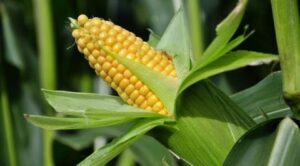
Successful exports of Ukrainian grain under the Black Sea Grain Initiative have helped to reduce world prices and strengthen food security, according to a report published on Twitter by the Ministry of Defense of the United Kingdom of Great Britain and Northern Ireland on Friday.
“During this initiative, more than 32 million tons of food entered the world market, and the food price index fell by 23% compared to its peak in March 2022. Developing countries have particularly benefited from lower prices, as well as from direct grain imports from Ukraine,” the statement said.
At the same time, Russia’s withdrawal from the Black Sea Grain Initiative has led to a reduction in exports from Ukraine, which, according to British intelligence, “is a clear attempt to degrade the Ukrainian economy and its ability to maintain its military capabilities.”
The report emphasizes that the agricultural sector accounted for 40% of Ukraine’s exports before the war and remains vital to the country’s economy. In total, food exports from Ukraine amounted to $28 billion in 2021.
“Ukraine has succeeded in using alternative methods of grain exports, such as river, rail, and road transport; however, it is unlikely that this will match the capacity of the Black Sea export routes,” the British intelligence service said.
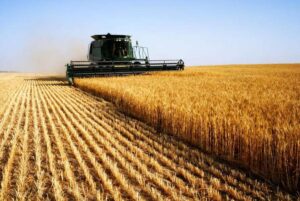
Ukrainian farmers have already harvested 34 million tons of grain, Prime Minister Denys Shmyhal said.
“The harvest is underway. As of today, 34 million tons of grain have been harvested. In particular, 22 million tons of wheat,” Shmyhal said at a government meeting on Friday.
According to the prime minister, the domestic demand is about 6-7 million tons per year, so Ukraine feels quite confident in food security.
“We continue to work on expanding our export potential. It is important for our economy and important for global food security,” he added.
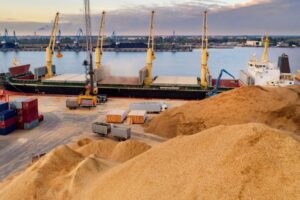
Ukraine has begun exporting grain through Croatian seaports, First Vice Prime Minister and Minister of Economy of Ukraine Yulia Svyrydenko said during a bilateral meeting with Prime Minister of the Republic of Croatia Andrej Plenkovic at the Three Seas Initiative Summit in Bucharest.
“Ukrainian grain has already been exported through Croatian ports. Thank you for this opportunity. This trade route, although niche, is already popular. We are ready to develop it by expanding the capabilities of the transportation corridor. We believe that this logistics route will play an important role in bilateral trade between our countries even after the war,” the press service of the Ministry of Economy and Trade quoted her as saying.
According to the report, the parties discussed bilateral trade and exports of Ukrainian grain through Croatian ports. They also discussed the importance of jointly resolving the issue of export restrictions for Ukrainian exports. The meeting also touched upon the issues of demining, war crimes investigation, and opening new trade routes for Ukrainian grain exports.
The parties raised the issue of accelerating the localization of demining equipment production to start its production at the facilities of domestic enterprises.
“One of the most important tasks for Ukraine in the near future is to demine the territories and return potentially contaminated land to use. Both post-war recovery and further development of the national economy depend on the speed of this process. That is why we are grateful to all partners who help Ukraine resolve this issue,” Svyrydenko emphasized.
Plenkovic offered to assist Ukraine in investigating war crimes. This includes sharing Croatia’s experience and expertise in establishing special prosecutors and special police to investigate crimes committed during the war.
As reported, the main routes for exporting Ukrainian agricultural products after the shelling of port infrastructure on the Black Sea remain land transport and seaports on the Danube.
In May 2023, the European Commission banned imports of wheat, corn, rapeseed, and sunflower from Ukraine to Bulgaria, Hungary, Poland, Slovakia, and Romania at the insistence of these countries. On June 5, the European Commission extended the ban until September 15, 2023.
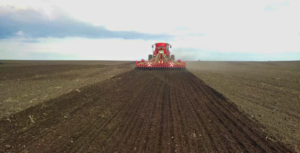
Agrarians of all regions of Ukraine have started sowing winter crops for grain, as well as actively sowing rape. As of early September, 699.7 thousand hectares of winter crops have already been sown, including 654.9 thousand hectares of rape and 44.8 thousand hectares of grain, the press service of the Ministry of Agrarian Policy and Food reported.
According to the report, winter wheat has already been sown on 42.5 thousand hectares, winter barley on 1.2 thousand hectares, winter rye – 1.1 thousand hectares.
According to the ministry, due to favorable weather conditions sowing of rape has already been completed in Volyn, Poltava, Sumy and Ternopil regions. The largest areas under winter rape are now in Ternopil (72.5 thousand hectares), Vinnitsa (67.2 thousand hectares) and Kirovograd (59.4 thousand hectares) regions.
As reported, according to a survey conducted by the Ministry of Agrarian Policy, the vast majority of agrarians do not plan to significantly change the sowing areas under winter crops in 2024 compared to last season.
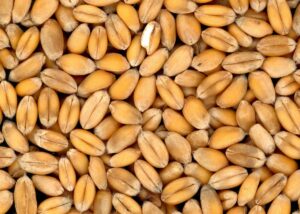
Poland will not allow grain imports from Ukraine after September 15, as the interest of Polish farmers is more important to the country’s government than any EU rules on this issue, said Polish Minister of Agriculture and Rural Development Robert Telusz.
“We know what could have happened if grain (from Ukraine) had arrived in Poland after September 15. Especially since the price of grain is currently low, and the granaries are already full. We know that this is in our interest and we will defend it. That is why I am going to Spain with this message to the summit of agriculture ministers,” the Polish publication farmer.pl quoted him as saying during the National Agricultural Exhibition in Czestochowa last Sunday.
Telusz informed the public that on Monday he will visit Spain, where he will convince the European Union to extend the ban on grain imports from Ukraine to the EU until the end of 2023 after September 15, together with representatives of other frontline countries – Hungary, Bulgaria, Slovakia, and Romania.
“When the war in Ukraine broke out, Polish society, including farmers, became the saviors of the Ukrainian cause. (…) Polish society became a lifesaver. Today in Brussels, we are loudly declaring: a dead rescuer is a bad rescuer. We will not allow the Polish farmer to lose because of arbitrary decisions of officials from Brussels,” said Deputy Minister of Agriculture Krzysztof Ciezora.
According to Janusz Kowalski, the State Secretary of the Ministry of Agriculture, the Polish government has supported Polish farmers to the tune of EUR 3.181 billion, while the amount of financial support from the European Commission is only EUR 63.614 million.
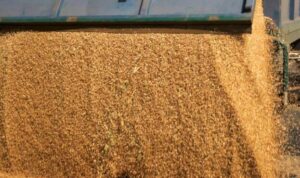
If necessary, Poland will impose a unilateral ban on imports of Ukrainian grain after September 15, while the transit of goods will be maintained, Agriculture Minister Robert Telusz told Polsat News at a press conference on Tuesday.
He denied media reports that a split in the coalition of countries banning Ukrainian grain imports had occurred and that the number of EU member states opposing Poland’s position on extending restrictive measures after September 15 had increased from 13 to 20.
“This is the first time I’ve heard that more countries are against it. I have talked to many ministers from the European Union about this. I see an understanding that we need to build a coalition. We have to build a mechanism. I am convinced that Romania is a member of the coalition,” Telusz was quoted as saying by the Polish publication farmer.pl.
He also said that next week he will hold talks with representatives of Slovakia to determine together “in which direction we will move.”
“At the moment, I have no doubt that there is a coalition,” Telusz assured.
The Polish minister emphasized that keeping the ban on the import of Ukrainian grain only until September 15 is “a political argument to further destabilize the situation in Poland.”
“We will not allow this,” he assured.
The Polish government wants this issue to be resolved “amicably in the European Union, so that there is no need to break down the door.”
“If it is necessary (…) to introduce unilateral bans, we will introduce them, because we are concerned about the interests of farmers (…), and there is no discussion on this topic,” Telusz stated.
Answering a question about possible risks of penalties being imposed on Poland if it violates the rules of the single market, the Minister said that “I don’t want to hear how we, the Poles, are being scared by fines (…)” and added that Poland “will pursue a tough policy in the interests of the Poles.”
Telusz said that Poland is in dialogue with Ukraine, Lithuania, and Latvia to transit grain through Poland.
“We are in dialogue with Ukraine, as well as with Lithuania and Latvia, to use their ports,” he said, and assured that the grain that leaves Poland does not return.
“If we are talking about the food security of Poland, the food security of Europe, then the grain must flow to Europe and must flow outside of Europe. We will help you on the way,” the head of the Polish Ministry of Agriculture said.
According to him, before the ban on the import of Ukrainian grain, about 114 thousand tons of grain entered Poland in transit, and in June – 260 thousand tons. At the same time, about 6 million tons of grain “left” Poland. Poland has about 3-4 million tons of grain left, “but this is a reserve that should always be there,” as the monthly demand for it is 2.5 million tons, the Polish Minister of Agriculture explained.
On June 5, the European Commission agreed to extend until September 15 the restrictions on exports of wheat, corn, rapeseed and sunflower from Ukraine to Bulgaria, Hungary, Poland, Romania and Slovakia. “The restrictions do not imply a ban on the transit of these goods through Bulgaria, Hungary, Poland, Romania and Slovakia,” reads the document signed by EC President Ursula von der Leyen.